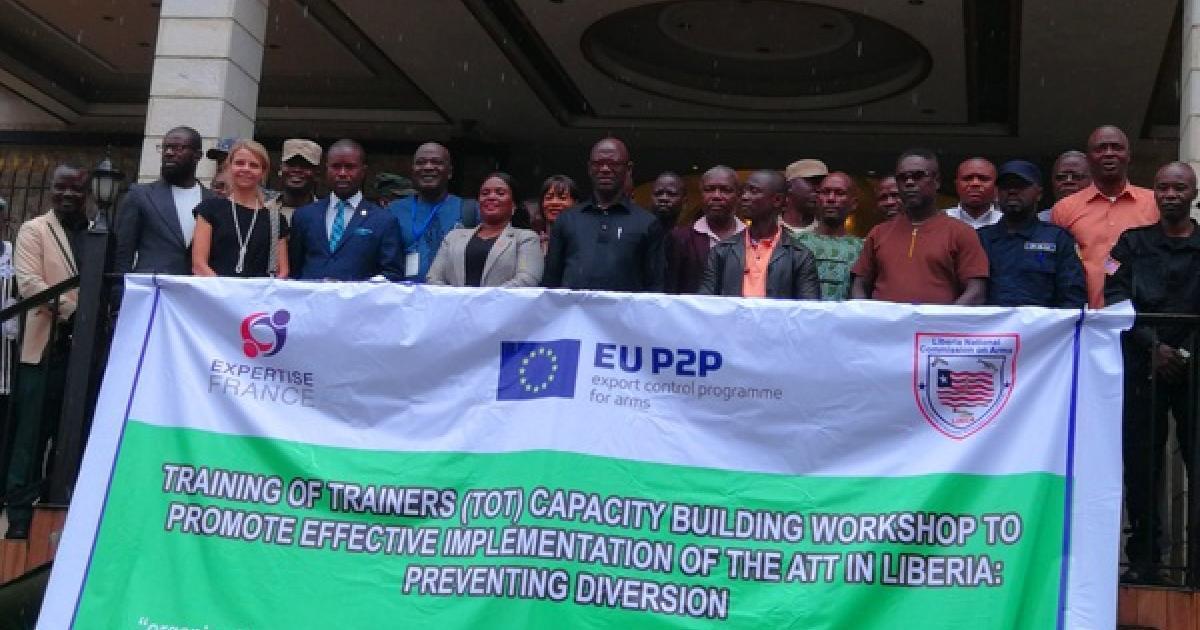DAVID A. YATES
Africa-Press – Liberia. The Board Chairman of the Liberia National Commission on Small Arms (LiNCA) has committed Liberia to the effective implementation of the Arms Trade Treaty (ATT), to which Liberia is a state party.
Jefferson A. Karmoh, who is also the National Security Advisor to the President George Weah, also committed the country to the effective use of the treaty.
ATT is an international treaty that regulates international trade in conventional arms and seeks to prevent and eradicate illicit trade and diversion of conventional arms by establishing international standards governing arms transfers.
The Treaty came into force on 24 December 2014. At this stage, the Treaty has a total of 113 States Parties and 29 members including Liberia that have signed but not yet ratified the Treaty.
Karmoh, who spoke at the opening of a two-day training of trainers (ToT) workshop, said that the government will continue to support the regulation of arms as a way of promoting a peaceful society. This, he said, will be made possible by building the capacity of the State Security Agency to effectively control the transfer of conventional arms across our borders.
The ongoing ToT workshop is organized by the LiNCA and France Expertise with support from the European Union’s Arms Trade Treaty Outreach Programme III in Monrovia. It brought together officers from the Liberia National Police, Custom officers of the LRA, AFL, and Immigration, among others.
The training is aimed at promoting effective implementation of the ATT in Liberia.
Karmoh acknowledged Expertise France for collaborating with LiNCA–an initiative that is geared towards enhancing the capacity of state security, customs officers.
The state security agencies are the key implementers of the Arms Treaty to prevent the diversion of arms and ammunition, but Karmoh also acknowledged international partners including ECOWAS, UNDP, and others for their support.
The Liberian government has been taking proactive steps in ensuring that arms are adequately controlled in the country. The government amended the Firearms and Ammunition Control Act of 2015 in 2022 to domesticate the Entry Treaty, the Integrated Relevant and Trade Treaty, provisions on trade, and the transfer of answers to ammunition.
In addition, the government enacted a law to repeal the act establishing LiNCA of 2012 to create the Liberia National Arms, LiNCA, as the national corporation and authority to supervise the implementation of the ATT in Liberia.
“Even though Liberia is not a manufacturing state or a huge importer of conventional arms, there are several hundred miles of coastal and land borders surrounding us with other countries, which, if not properly controlled, may be used to promote diversionary activities.” Karmoh added. “As you may know, diversion or illegal transfer of weapons can be implemented at various stages. Drain transport, upon import, drain transit, and our storage facilities.”
The LiNCA Board Chaired and the National Security further informed the participants that in order to prevent the unregulated control of conventional arms, the entry treaty obligates Member States to put in place systems and measures, including building the capacity of key actors to address diversion-related activities.
The training of trainers workshop is expected to provide participants with practical knowledge to prevent diversion, including tools and goods practices, techniques, and mental skills, as well as enhance their understanding of key provisions of the ARM on Trade, the Treaty on Trade Transfer.
They are also being trained to curb the transshipment of conventional arms in a timely and laudable venture to perform the effective implementation of the entry treaty in Liberia.
LiNCA Executive Director, Vivian D. Dagbey, said the training of trainers is a capacity-building workshop that is very important at this time considering that Liberia, as a state party to the ATT, is obligated to effectively implement the ATT.
Dagbey asserts, “We must know that this initiative complements the Government of Liberia and the many efforts to promote the implementation of the treaty in Liberia.”
She said Liberia has over the years contributed by putting into place numerous measures to ensure that Liberia effectively implements the arms retreat.
“This training is very, very important. Diversion is the issue that is being spell out in the Armstrong Treaty. Liberia has domesticated the Armstrong Treaty, and it is our obligation to ensure that we implement all provisions of the treaty, including preventing diversion across our borders,” the Executive Director added.
Dagbey, in her excitement, informs the participants that, following this training, they will have a group of men and women with the requisite expertise to contribute to those diversion measures in Liberia.
For her part, Ms. Sigrid Lipott, Expertise France, said her institution, alongside the German Federal Office of Economics and Export Control, mandated them to implement this third phase of EU activities in support of both the implementation and the universalization of the Acts Treaty on the basis of Council Decision 23/09 of 2021, and that in its third phase, the UHD office program has some very clear-cut objectives.
She said the training is also intended to promote practical implementation of the entity-specific regions, including Western Africa and other regions, to build capacity and expertise for the implementation of the entity-beneficiary countries through assistance that is typically demand-driven and includes support for capacity building in the national region, international conferences, ad hoc support, and to promote several lines for those countries.
For More News And Analysis About Liberia Follow Africa-Press






